JUBILEE ALBUM – 70th ANNIVERSARY OF THE CENTRE FOR FOREIGN LANGUAGE TEACHING AT THE UNIVERSITY OF WARSAW (EBOOK)
SELECTED DATES FROM THE HISTORY OF THE CENTRE FOR FOREIGN LANGUAGE TEACHING
1953
Establishment of the Centre for Practical Foreign Language Teaching at the University of Warsaw
1960s
Renaming to the Centre for Foreign Language Teaching at the University of Warsaw
Late 1970s
Incorporation of the Centre into the Institute of Applied Linguistics at the Faculty of Russian and Slavic Studies
31 December 1981
Restoration of the Centre’s independence
1986
Renaming to the Interfaculty Center for Foreign Language Teaching
Early 1990s
Transfer to the southern wing of the Uruskich (Czetwertyńskich) Palace
22 June 2005
Adoption of Resolution No. 341 by the University of Warsaw Senate on the University System of Foreign Language Teaching and Language Proficiency Certification
13 December 2006
Adoption of the SzJO Regulations by the University of Warsaw Senate
7 June 2009
Adoption of Resolution No. 119 by the University of Warsaw Senate on the University System of Foreign Language Teaching and Language Proficiency Certification
6 July 2016
Approval of the new SzJO Regulations
1 October 2023
Renaming to the Centre for Foreign Language Teaching
60th ANNIVERSARY OF THE CENTRE FOR FOREIGN LANGUAGE TEACHING
Over the course of 60 years, the centre has changed along with the times, starting with its name. It was first known as the Centre of Practical Language Learning, then the “minimalist” Centre for Foreign Languages, followed by the acronym MONJO (Interfaculty Center for Language Teaching), and finally, in 1991, it adopted its current name – simple, unpretentious, and shared by many distinguished higher education institutions in various countries.
The centre’s location has also changed over the years, from the first floor of the Polish Studies building to the “corner” above the post office in the Auditorium Maximum, Oboźna, and Nowy Świat 69. Today, in addition to the second floor on Nowy Świat, the centre has its own building on the main campus inherited from the English department.
Teaching materials and styles have also evolved over the years. Today, the focus is on efficient communication with an emphasis on academic or specialized languages. The teacher or lecturer now serves more as a guide and facilitator than the traditional walking textbook. Students now travel on EU scholarships, and there are more international students (including those from Japan, China, India, Kazakhstan, Turkmenistan, Saudi Arabia, South America, and most European countries) attending classes. The perception of languages has also changed, and there are now more language options available at the centre.
With over a hundred teachers, the Centre for Foreign Language Teaching is the largest language teaching unit at the University of Warsaw as part of the University System of Foreign Language Teaching. Each year, more than 7,000 students take language courses at the centre.
More information can be found on page 7 of the UNIWERSYTET WARSZAWSKI publication, issue number 5 (65), October 2013.
[The photos below show the community of the Centre for Foreign Language Teaching (SzJO) and guests celebrating the 60th anniversary of the Centre for Foreign Language Teaching at the University of Warsaw, in the Zamoyski Palace hall and during the planting of a ginkgo tree in the palace garden in April 2014.]
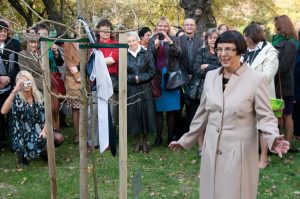
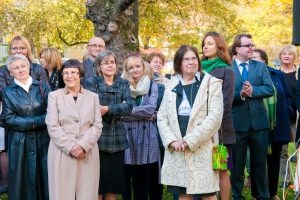
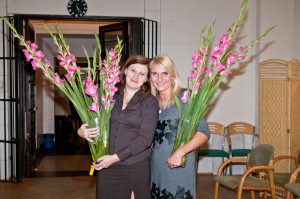
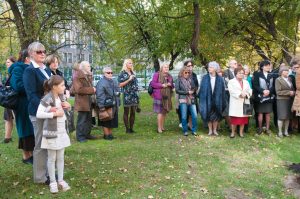
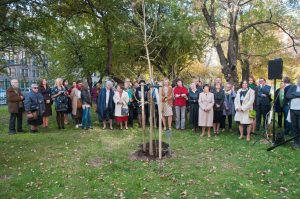
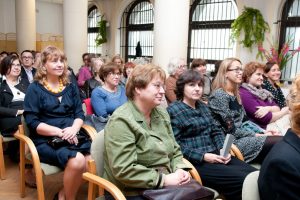
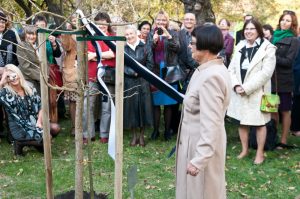
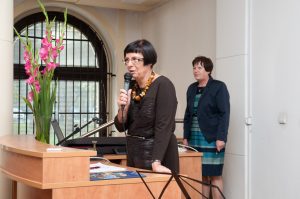
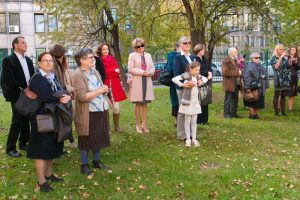

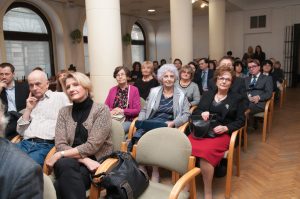
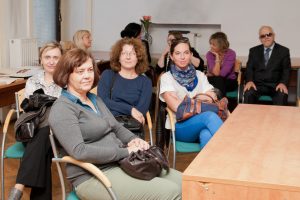
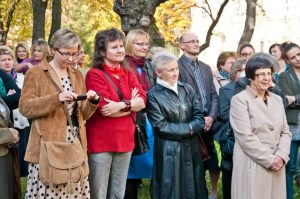

50th ANNIVERSARY OF THE CENTRE FOR FOREIGN LANGUAGE TEACHING
“The first stage was the establishment of the Centre of Practical Language Learning. Based on the decree of the Ministry of Higher Education, the then rector created the Centre of Practical Language Learning, which included full-time language lecturers: 13 for Russian, 4 for German, 3 for French, and 5 for English.
The first head of the centre was Mr. Piotr Sobolewski, a man with an extremely interesting biography and diverse interests. Born in Vilnius to an intellectual family, he studied theology at the University of Warsaw before World War II, then went to Athens for doctoral studies. During the occupation, he was involved in secret teaching, and after the war, he became the secretary of the Special Commission for the Investigation of German Crimes and co-created the museum at Majdanek. He later worked as a civil servant at the Ministry of Foreign Affairs but resigned to start teaching at the University of Warsaw. In 1959, he graduated in Russian philology and became the head of the Centre of Foreign Languages.
The centre was divided into teams of teachers of Russian, French, German, and English, and also taught Latin. In the 1960s, it was called the Centre of Foreign Languages at the University of Warsaw and taught 6,000 students. They learned Russian (which was mandatory) and one Western language (from a choice of three), as well as Latin if required by the program of study. Classes were held in the first and second years, two hours per week. The centre organized optional groups for individual faculties. Interestingly, classes for students going abroad were held, as it was then called, by magnetic tape or adapter, among others, at the phonetic center of the French Cultural Institute. In addition, it was stipulated that language courses should take place in the morning hours, at least once a week for two hours.”
More information can be found on pages 18-20 of the publication UNIWERSYTET WARSZAWSKI, issue 2 (18), April 2004.
DIRECTORS
Since 2017
Andrzej Dąbrowski
Deputies: Magdalena Biesiadecka Anna Cegiełka
2010-2017
Mirosława Wojciechowska-Szepczyńska
Deputies: Andrzej Dąbrowski Janina Furgał (2010-2017) Bartosz Jurczak
2006-2010
Hanna Mrozowska
Deputies: Mirosława Wojciechowska-Szepczyńska Sławomir Maskiewicz (2007-2009) Elwira Piotrowska Marek Lewicki
2002-2005
Hanna Kaczmarczyk
Deputies: Janina Furgał (2002-2006) Jolanta Solarska-Wojewoda
1991-1996 and 1999-2000
Janina Furgał
Deputies: Jolanta Urbanik (1991-2002)
Józef Dobrowolski (head of educational affairs 1989-1995)
Before 1990
Deputies: Paweł Cichawa (until 1991)
HEADS AND COORDINATORS OF LANGUAGE TEAMS
English Language Team
- Since 2021: Anna Łętowska-Mickiewicz
- 2010-2021: Elżbieta Habielska / Deputy: Sylwia Kossakowska-Pisarek (2013-2017); Agnieszka Harrison (2018)
- 2007-2010: Bartosz Jurczak / Deputy: Agnieszka Harrison
- 2006-2007: Bożena Górska-Poręcka
- 2003-2006: Maria Wożniak
- 1997-2003: Mirosława Wojciechowska-Szepczyńska
- Before 1997: Mirosława Wojciechowska-Szepczyńska (1987-1991) Jolanta Urbanik (1987-1991) Krystyna Paszkowska-Hoppe Jan Bartkowski Marta Franciszkiewicz (Pasierbińska) (1994-1995) Agnieszka Wiloch-Sikorska (1992-1994) / Deputy: Ewa Górczyńska Anna Chachulska-Julien
Team of German Language / Germanic Languages
- since 2006: Elżbieta Lewkowicz
- 2005-2006: Elżbieta Fijałkowska – substitute in 2005 for Ms. Kamińska; then one year as head
- 1991-2005: Krystyna Kamińska
- 1990-1991: Barbara Domińska
- before 1990: Irena Grzesiowska
Team of Romance Languages
- since 2021: Arkadiusz Misiak
- 2007-2021: Jolanta Morytz
- 2003-2007: Irena Dąbrowska
- 1989-2003: Róża Somla-Dębowska
- before 1989: Kalina Szymanowska Leszek Chachulski
Team of Russian Language
- since 2018: Magdalena Ziółek-Wojnar
- 2017: Krzysztof Świrko
- 2007-2017: Wojciech Sosnowski (with a break for leave 2015-2016 – acting head Magda Tulska-Budziak)
- 1990-2005: Jadwiga Koperska
- ? Lidia Wróbel
- 1985-1986: Janina Furgałowa – acting head of the team in place of Zofia Bałakier (on leave)
- 1970s/1980s: Alicja Spirydowicz
- ? Stanisław Nikoniuk